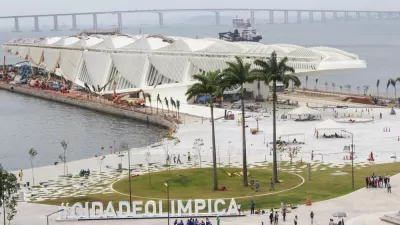With the Olympic games, and millions of visitors, descending on London this summer, Sarah Lyall looks at how the capital city is hoping to spare users of its ancient road network and temperamental subway system from a transportation nightmare.
For a city renowned for its unpredictable congestion, city officials are pulling out all the stops to try to prevent transportation chaos during the two weeks of Olympic games. Lyall explores these efforts, which range from prioritized Olympic traffic lanes to outright scare tactics.
"London's commuters have been warned to expect gridlock on the roads and paralysis on the subways. They have been advised to leave home well before rush hour; to travel by foot, bicycle or boat; and to forget about trying to drive anywhere even remotely connected with the Olympics."
"The government has braced itself for the onslaught with a $10.2 billion spending spree on transportation improvements over the last seven years. It has increased capacity on some train and subway lines, spruced up others and built new services like the javelin train, which travels between St. Pancras and Olympic Park in a cool seven minutes (when it works), a trip that would normally take about half an hour."
"Tony Travers, director of the Greater London Group at the London School of Economics, said all the planning in the world could not remove the two biggest obstacles to a happy traveling experience in London: the city's twisty, snarly, ancient road network and its temperamental subway system."
FULL STORY: Londoners Dread Traffic as City Plans Olympics

Planetizen Federal Action Tracker
A weekly monitor of how Trump’s orders and actions are impacting planners and planning in America.

San Francisco's School District Spent $105M To Build Affordable Housing for Teachers — And That's Just the Beginning
SFUSD joins a growing list of school districts using their land holdings to address housing affordability challenges faced by their own employees.

The Tiny, Adorable $7,000 Car Turning Japan Onto EVs
The single seat Mibot charges from a regular plug as quickly as an iPad, and is about half the price of an average EV.

Seattle's Plan for Adopting Driverless Cars
Equity, safety, accessibility and affordability are front of mind as the city prepares for robotaxis and other autonomous vehicles.

As Trump Phases Out FEMA, Is It Time to Flee the Floodplains?
With less federal funding available for disaster relief efforts, the need to relocate at-risk communities is more urgent than ever.

With Protected Lanes, 460% More People Commute by Bike
For those needing more ammo, more data proving what we already knew is here.
Urban Design for Planners 1: Software Tools
This six-course series explores essential urban design concepts using open source software and equips planners with the tools they need to participate fully in the urban design process.
Planning for Universal Design
Learn the tools for implementing Universal Design in planning regulations.
Smith Gee Studio
City of Charlotte
City of Camden Redevelopment Agency
City of Astoria
Transportation Research & Education Center (TREC) at Portland State University
US High Speed Rail Association
City of Camden Redevelopment Agency
Municipality of Princeton (NJ)





























